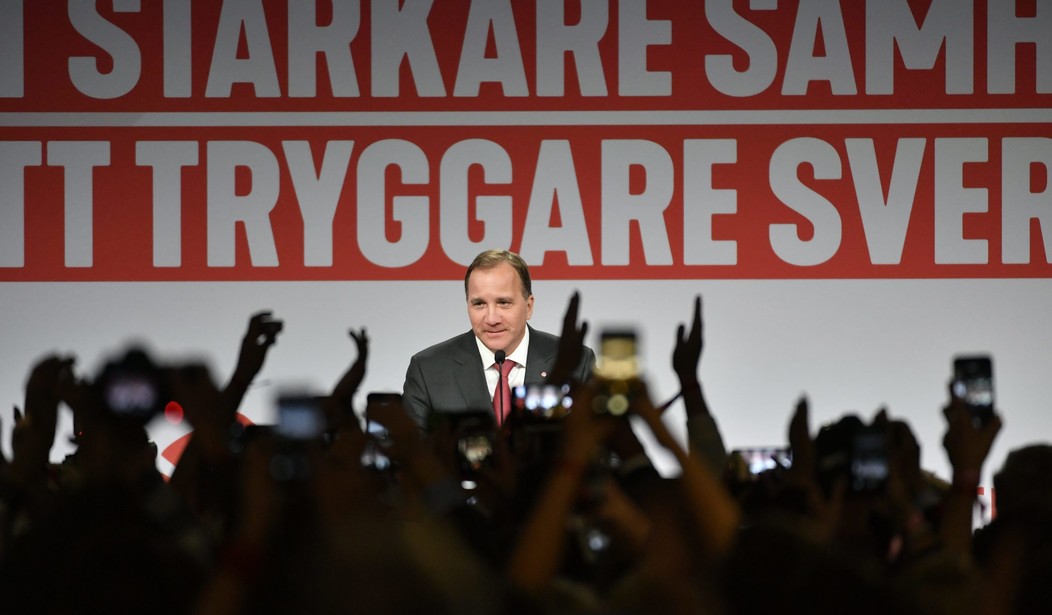For much of this summer, and right up until September 9 — Election Day in Sweden — media around the world predicted that voters in that country would switch, in massive numbers, to the Sweden Democrats, the much-maligned and, until recently, very marginal anti-Islam party. “Swedish politics,” reported Reuters on September 5, “are set to lurch to the right in Sunday’s election.” On September 8, a Daily Mail columnist explained why “the most liberal country in Europe” was “lurching to the Far Right.”
I wanted to believe it, but it sounded too good to be true. In the end, alas, it was. The Sweden Democrats won 18% of the vote. Yes, it marked yet another increase in support for a party that’s grown steadily since the turn of the century (2002: 1.4%; 2006: 2.9%; 2010: 5.7%; 2014: 12.9%). Yes, the long — dominant Social Democrats — who are the main culprits behind Sweden’s disastrously high immigration levels and its systematic prioritization of immigrant welfare over the well-being of native Swedes — had their worst results since 1911. And yes, the Sweden Democrats, long surrounded by a cordon sanitaire, may end up being able to throw some weight around when the new government is formed.
But in the final analysis, it was a disappointment. Time is of the essence. Sweden is on the brink. Its people don’t have decades to wait before changing course. In the view of many, this was their last chance.
Hopes for a Swedish electoral revolution may have been inflated, in large part, because of the encouraging results of last year’s elections in Austria and the March 4 vote in Italy, which put into power a coalition government that pledged to control illegal immigration — and that has since turned away ships packed with migrants. (The other day, when chided by an UN official for this practice, Interior Minister Matteo Salvini suggested that the UN “look for racism elsewhere” and “investigate its member States who ignore basic rights like freedom and equality between men and women.”)
But so far, in Western Europe, Austria and Italy have been flukes. Take the Netherlands. Some of us can remember cheering on the 2002 candidacy of Pim Fortuyn, whose brilliant and charismatic arguments for his strongly anti-Islam and anti-immigration platform seemed destined to win him the prime ministership – and put him in a position to start a chain reaction of sensible reform across Western Europe. Nine days before the election, he was assassinated. Sixteen years later, the Netherlands is nowhere near recovering the crucial ground lost since his death. In last year’s election, Geert Wilders’s Freedom Party won 13% of the vote, up from 2006 (6%) but down from 2010 (15%). The Forum for Democracy, a new party, run by Thierry Baudet, that also serves up blunt talk about Islam and immigration, won 1.8% last year. No revolution there yet.
In Norway, the Progress Party, which promised action on Islam, finally got enough votes in 2013 to enter a coalition government — whereupon it promptly dropped its promises down the memory hole. In Germany, the Alternative for Germany won 12.7% of the votes in last year’s election, up from 4.7% in 2013. In France, National Rally (formerly National Front) won 13.2% in last year’s first-round vote, down from 13.6% in 2012, although its second-round vote jumped from 3.7% to 8.8%. Impressive gains, perhaps, but not enough to make any real difference.
Meanwhile, in the UK, where the overextended police forces put less priority on investigating mass child rape by Muslim gangs than on tormenting decent citizens who criticize Islam on Facebook, UKIP, which, under Gerard Batten, has finally stopped dancing around Islam, won 1.8% of the vote in last year’s general election — equal to exactly zero MPs. As for Anne Marie Waters’s even more laser-focused For Britain party, it can barely get its foot in the door.
It’s true that across Western Europe, the natives are getting restless — some of them, anyway. More and more of them, in fact. But just not a sufficient number of them. And not fast enough.
Outside of Italy and Austria, indeed, the only Western European country that inspires any kind of hope is Denmark, where the immigration-focused Danish People’s Party has exerted enough influence in this century (winning 21% of votes in 2015, up from 12-13% in the four previous parliamentary elections) to ensure that that country’s immigration policies are a good deal saner than the Western European norm.
Otherwise there have been gains, but only small ones. It all seems like too little, too late. Time is of the essence. But the numbers aren’t climbing as quickly as needed to forestall a nightmare.
Certainly the Swedish results feel that way. Many observers in neighboring Norway and Denmark viewed this election as Sweden’s last chance. After the lame results, some of them have thrown in the towel. Denmark’s leading critic of Islam, Lars Hedegaard, complained the other day that Swedish voters have opted for “collective suicide.” Norway’s leading critic of Islam, Hege Storhaug (author of a Norwegian bestseller that’s about to be published in English under the title Islam: Europe Invaded, America Warned), used the words “civilizational suicide.” Thanks to the Sweden Democrats’ poor showing, Storhaug wrote, their country of ten million, which already has the continent’s largest percentage of Muslims, will take in four to five hundred thousand more immigrants in the next three years alone.
Storhaug pointed out that “it used to be rather easy to feel sorry for the Swedes” because their elites are even more dishonest about immigration and Islam than their counterparts in Norway. But it’s hard to keep that sympathy alive. Thanks to their access to alternative online media, the Swedes can no longer plead ignorance about their nation’s dilemma. Yet on September 9 they went to the ballot boxes and, as Storhaug put it, “voted themselves closer to their own doom.”
It’s hard not to agree. Several Norwegians I know have suggested that, after this pathetic election result, it’s time to stop caring about the fate of Sweden and start worrying more about the impact that its continued rapid Islamization will have on their own country — which, while better off, is headed down the same path. I’ve even heard talk about putting up a wall between Norway and Sweden. Unfortunately, these countries share a thousand-mile border — half the length of the U.S.-Mexico border, but exceedingly long in relation to the number of people living on both sides. It’s a project that the present Norwegian government would never conceivably pay for — even though it would probably cost a lot less than a few years of handouts to an ever-growing cohort of unemployable newcomers.
In any event, I find myself unable to give up entirely on Sweden — if only because surrendering it to the caliphate means diminishing the Free World by just that much and encouraging cultural jihad generally. Still, it’s hard not to find oneself wondering: if the Swedes care so little about their future, why should we?








Join the conversation as a VIP Member